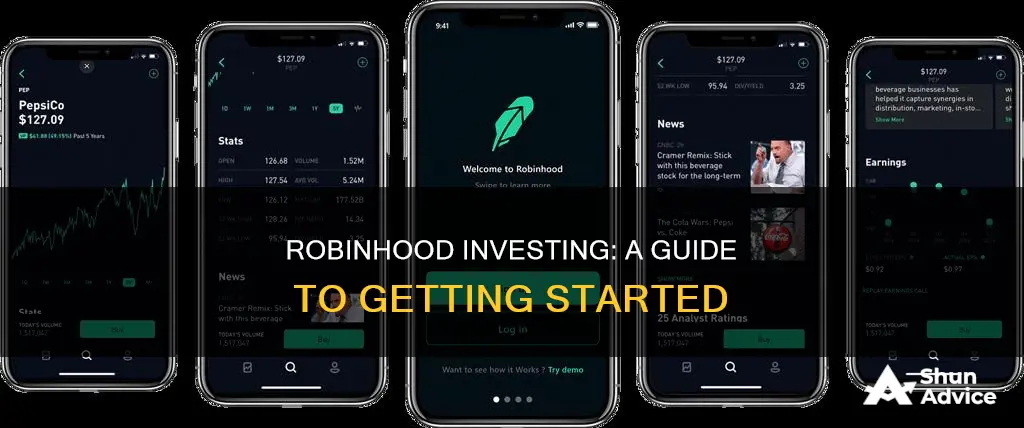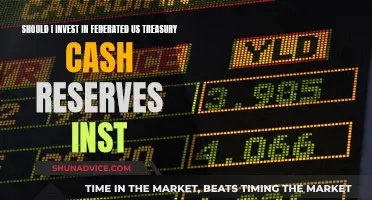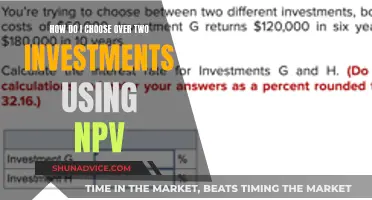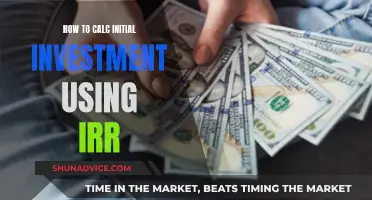
Robinhood is a commission-free investment app that allows users to trade stocks, ETFs, options, and cryptocurrencies. With no minimum account balances, users can invest as much or as little as they want starting at $1. The app also offers a premium service called Robinhood Gold for $5/month, which includes benefits such as higher interest rates on uninvested cash and a higher percentage match on IRA contributions. Robinhood has a simple, intuitive, and user-friendly interface, making it a good choice for beginner investors. However, it has limited investment options and lacks transparency, making it unsuitable for sophisticated investors. Overall, Robinhood provides a platform that makes it easy and enjoyable to trade for beginners.
| Characteristics | Values |
|---|---|
| Commission fees | No commission fees for stock, ETF, options, and cryptocurrency trading |
| Account minimums | No account minimums |
| Investment options | Stocks, ETFs, options, cryptocurrencies, fractional shares |
| IRA | 1% match on IRA contributions (3% for Gold members) |
| Interest rate | 0.01% for free accounts, 4.5% for Gold accounts |
| Customer support | 24/7 in-app chat, extended-hours phone support available from 7 a.m. to 9 p.m. ET, Monday to Friday |
| Security | Multi-factor authentication, 24/7 account monitoring |
What You'll Learn

Getting started with Robinhood
- Sign Up: Visit the Robinhood website or download the mobile app and sign up for an account. Provide your personal information, contact details, and Social Security number. You'll also need to choose a funding method for your account, such as linking a bank account.
- Funding Your Account: After your account is approved, you can start funding it. Robinhood offers instant verification with many major banks, allowing for instant bank transfers of up to $1,000 for investing. Transfers larger than $1,000 may take a few business days to process.
- Choosing Investments: Robinhood offers a range of investment options, including stocks, ETFs, options, and cryptocurrencies. You can trade these assets commission-free, meaning you don't have to pay any fees when buying or selling.
- Placing Your First Trade: Once your account is funded, you can start trading. Simply search for the asset you want to trade, whether it's a stock, ETF, or cryptocurrency, and place your order. You can buy or sell with just a few clicks.
- Monitoring Your Portfolio: Robinhood provides a user-friendly interface to monitor your investments. You can track your portfolio's performance, view charts and analysis, and set up alerts to stay informed about your investments.
- Additional Features: Robinhood offers a variety of additional features to enhance your investing experience. This includes access to research and market data, a dividend reinvestment program, and the ability to set up recurring investments. You can also explore more advanced trading options, such as options trading, if you're feeling more confident.
Remember, investing carries risks, and it's important to consider your financial goals and risk tolerance before diving into the world of investing. Robinhood provides educational resources and tools to help you make informed decisions. It's always a good idea to do your research and understand the potential risks and rewards before committing your money.
TFSA Investment Strategies: Make Your Money Work Harder
You may want to see also

Robinhood's investment options
Robinhood offers a range of investment options to its users, allowing them to run their money their way. With Robinhood, you can invest in stocks, ETFs, and their options, as well as crypto, all commission-free. This means you can invest in various financial instruments according to your preferences and strategies.
One of the key investment options available through Robinhood is stocks. The platform offers commission-free trading on stocks, allowing you to buy and sell shares of publicly traded companies. This enables you to build a portfolio of stocks that align with your investment goals.
Another investment avenue available through Robinhood is Exchange-Traded Funds (ETFs). ETFs are baskets of securities that trade on an exchange like a stock. They provide a way to invest in a diversified portfolio of assets, such as stocks, bonds, or commodities, offering exposure to a particular market or industry.
Additionally, Robinhood offers options trading. Options are contracts that give the owner the right to buy or sell a certain security, like stocks, at a specified price, by a certain date. Options trading can be used for speculation, hedging, or generating income, providing a versatile tool for investors.
Furthermore, Robinhood enables users to invest in cryptocurrencies, including popular options like Bitcoin (BTC), Ethereum (ETH), Dogecoin (DOGE), and more. This provides an opportunity to diversify your portfolio and invest in the emerging digital asset class.
It's important to remember that investing carries risks, and these risks vary across different investment options. Before investing, it's essential to carefully consider your investment objectives, conduct thorough research, and understand the potential risks and rewards associated with each investment option.
Cash Payments for Trading Securities: An Investment Activity?
You may want to see also

Robinhood's fees and charges
Robinhood is known for its commission-free trading model, which applies to stocks, ETFs, options, and cryptocurrencies. However, it does have some fees and charges that users should be aware of. Here is an overview of Robinhood's fee structure:
Commission-Free Trading
Robinhood does not charge commission fees for buying or selling stocks, ETFs, options, or cryptocurrencies. This has been a significant draw for users, especially those new to investing.
Regulatory and Trading Activity Fees
While Robinhood does not charge commissions, it does pass on certain regulatory fees to its users. These include the Trading Activity Fee (TAF) and the Regulatory Transaction Fee charged by regulatory bodies like FINRA and the SEC. As of January 1, 2024, the TAF is $0.000166 per share for equity sells and $0.00279 per contract for options sells. The SEC fee, as of May 22, 2024, is $27.80 per $1 million of principal for sell orders.
Account Fees
Robinhood does not charge any fees to open, close, or maintain a spending or investment account. There are also no inactivity fees. However, if you wish to transfer assets out of Robinhood, there is a transfer fee of $75.
ATM Fees
Robinhood charges a $2.50 fee for withdrawals from ATMs. However, if you have $300 or more in direct deposits over the last 34 days, Robinhood will reimburse these ATM fees. It is important to note that out-of-network ATM providers may also charge a third-party fee, which Robinhood does not reimburse.
Robinhood Gold
Robinhood Gold is a premium service that offers additional features such as increased instant deposit limits, access to margin trading, and more comprehensive financial data. It costs $5 per month, including the first $1,000 margin. Beyond that, additional interest fees apply based on the amount of margin used.
Withdrawal Fees
While Robinhood does not usually charge for withdrawing money, there is a fee of $100 for transferring stocks to another broker. Additionally, withdrawals from an external debit card account may have a fee of up to 1.75% based on the amount being transferred out.
Other Fees
There are also some other fees associated with specific services, such as paper statement deliveries, overnight check deliveries, and outbound asset transfers.
Morris Invest: The Cash-Only Strategy Explained
You may want to see also

Robinhood's trading platforms
In addition to its mobile app, Robinhood recently launched a new web-based trading platform called Robinhood Legend. This platform offers more advanced features and is designed for active traders who need deeper insights into the market and their positions. Legend provides enhanced charting capabilities, with the ability to view up to 8 charts in a single window and access to various chart types and technical indicators. It also offers improved portfolio analysis tools, such as dozens of metrics to monitor and analyze assets in watchlists, open orders, and positions.
Robinhood's platforms provide access to a range of trading tools and research amenities. The stock screener has over 20 filters, and Robinhood Gold subscribers get access to Morningstar's premium stock research reports. News is available through several outlets, including Wall Street Journal, Reuters, and Barron's. The platforms also offer educational content, such as the daily Robinhood Snacks newsletter and the Under the Hood podcast.
While Robinhood's platforms are user-friendly and offer a solid range of features, they may not be suitable for advanced traders. The mobile app, in particular, lacks some of the more complex trading tools and research options. Additionally, Robinhood's platforms have been criticised for their lack of transparency during outages and trading restrictions in 2021, which caused some traders to lose confidence in the platform.
Cash as an Investment: Pros and Cons
You may want to see also

Robinhood's security and customer support
Security is a key concern for any investment app, and Robinhood is no exception. The platform offers two-factor authentication, which requires a second piece of information in addition to your password when logging in or updating your account. This could be a verification code sent to your phone or a device approval request. This ensures that any login attempt is from a device you have access to and not an attacker.
Robinhood also provides guidance on security best practices, including how to identify and report scams. The company warns users to be vigilant against impersonation support scams, which are often found via search engine results or on social media. These scams may direct users to fake Robinhood customer service numbers, where they will be asked to provide personal information or transfer money or crypto to the scammer. Robinhood stresses that official customer support will never ask for your account login details or two-factor authentication codes.
In addition to these security measures, Robinhood offers comprehensive customer support through various channels. While the company does not provide a direct dial support phone number, users can request a callback through the app or by visiting robinhood.com/contact. Alternatively, customers can connect with Robinhood Support through live chat or email. The company also maintains a Help Center on its website, where users can find answers to frequently asked questions.
Robinhood's social media presence includes LinkedIn, Facebook, Twitter, and Instagram. While these platforms may not offer direct messaging capabilities, customers can often receive assistance by commenting on posts. Robinhood also provides specific email addresses for different types of inquiries, such as [email protected] for issues with scams and [email protected] for questions related to privacy.
Settled Cash for Investment: What's Available and How?
You may want to see also
Frequently asked questions
Signing up for a Robinhood account is a quick and painless process that happens within the app in a matter of minutes. You'll be asked to provide some personal information, contact details, your Social Security number, and your means of funding your account.
Robinhood provides 100% commission-free stock, options, ETF and cryptocurrency trades. However, there is a $100 outgoing ACAT transfer fee. Robinhood Gold, which offers a range of benefits, costs $5 per month.
Robinhood offers trading in stocks, options, ETFs, and direct cryptocurrencies. It also offers access to more than 650 foreign companies via American Depository Receipts.







